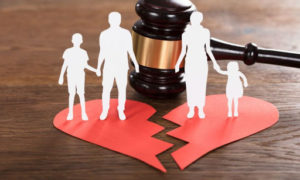How to Get an Emotionally Intelligent Divorce — Pioneers Reveal Why It’s So Important
Hiring the Right Attorney Makes All the Difference
BY PC Studios // 05.20.20Getting a divorce does not have to be another drag-out fight. An emotionally intelligent divorce offers a different way.
This article is part of a promoted series and not produced by the editorial staff.
Divorce is an emotionally charged process. It catches everyone off guard. No one says “I do” with a view towards someday dividing up assets and negotiating child custody arrangements when a marriage ends.
With the death of a marriage, a family unit is also dissolved. Divorce sets off a real grieving process. That often means that otherwise logical, even-keeled adults will find themselves reeling with feelings of denial, sadness and anger. In the midst of a divorce — when they need to be more focused and rational than ever — people often find themselves consumed by all those emotions.
That’s why choosing the right lawyer to guide you through a divorce is one of the most important decisions you will make in the process.
Carla Calabrese and Dawn Ryan Budner, of Dallas’ renowned Calabrese Budner family law firm, are pioneers in what they call an “Emotionally Intelligent Divorce”™. They protect what clients value most — family and financial security — without the damage that can result from traditional courthouse litigation. It’s vitally important to have an attorney with emotional intelligence in your corner ― one who is focused on reaching a resolution that meets your goals, rather than putting more logs on the fire.
In traditional divorce litigation, the court decides how to divide property and parenting responsibilities. It’s a zero sum game—there is a winner and a loser. The pre-trial discovery phase is invasive and expensive, and trial is rarely a cathartic “day in court” — as former spouses battle for their very lives.
“When people operate from a place of loss and fear about the future, it’s easy to lose sight of the ultimate goal,” Dawn Ryan Budner says. “What you want is a resolution that works for everyone and a workable co-parenting relationship going forward. Don’t choose a lawyer who creates conflict and takes an unnecessarily aggressive stance,” Budner adds.
Turns out you don’t need to hire a “bulldog” unless all you plan to do is fight. While some divorce attorneys focus on the friction ― racking up legal fees by running down to the courthouse as a matter of course, Calabrese Budner sees a better path.
Collaborative Divorce Is the Better Path
“Collaborative divorce is the only process that even acknowledges, let alone addresses, the underlying ‘emotional divorce’ that is present in every case,” Budner says. A collaborative divorce empowers you to forge a settlement that is right for your family and its unique circumstances. The process is private and you can avoid many of the delays, costs and uncertainties associated with traditional litigation.
Let’s face it, you don’t want to leave it up to a judge to make all those important decisions for you. You also don’t want to deplete your combined assets, which happens all too often, when irrational emotions lead people to fight just for the sake of fighting. That is where the litigation model ultimately leads.
“The challenge is educating the public about collaborative divorce. If people understand their options, who would choose the more expensive, combative process that gives up all control and destroys the relationship with their future co-parent?” Budner says. “Collaborative divorce resolves difficult issues without resorting to that wartime model.”
Don’t let the term make you think of weakness ― collaborative divorce is a powerful process that is built around you and your children. The more complicated the estate or relational issues — including affairs, addictions, personality disorders and other mental health issues ― the more you need collaborative divorce, and the counsel of lawyers like those at Calabrese Budner, who are trained in the process.

For a collaborative divorce to happen, both spouses must agree to the process. Look for an attorney with training and experience and ask how many collaborative cases the attorney has handled successfully. It’s worth the effort to find solutions outside the courtroom ― supported by professionals who will guide you to tailor-made solutions for your family.
“It’s really helpful to hire an emotionally intelligent lawyer, one who is trained and experienced in collaborative divorce. It will not only make or break your case — it can really impact the rest of your life,” Calabrese says.
Use Support Systems for Parents and Children
“Because people feel vulnerable during a divorce, we advise our clients to create a support system, which can include a therapist,” Budner says.
It’s helpful when close friends and family understand the collaborative model and how they can provide positive emotional support. Sometimes, people get entrenched in defense mode for a friend or loved one, which can actually perpetuate friction, rather than encouraging a resolution. Everyone needs to be on the same page, including the client’s support system.
“And, it’s not just parents who are under stress. Children have emotional needs that should be addressed. An unhealthy and litigious divorce is never in the best interest of a child. Divorce is an adult process. We don’t want to put that burden on children,” Carla Calabrese says.
For that reason, it’s imperative to rely on level-headed friends, and to educate them on your desire to lessen friction during your divorce and to focus your energies on the best outcome going forward.
“Everyone gets emotional,” Calabrese says. “But, the goal has to be on avoiding the damage, especially to the children of a divorcing couple.”
She suggests that friends and family learn how to listen without judgement and that they minimize advice and fanning the flames. “It’s a traumatic experience,” Calabrese says. “Kids can be damaged by conflict, especially during divorce, and those effects can last a lifetime. An emotionally intelligent divorce focuses on rational responses, rather than emotional ones.
“The most important thing to keep in mind is where the family will be at the end of the process.”
Even in Litigation, Emotionally Intelligent Attorneys Are Gamechangers
Even in litigation, Emotionally Intelligent Lawyering™ is the gamechanger. You want an attorney who understands the human emotions that come into play during a divorce and who also possesses the emotional intelligence and objectivity to give you focused and rational guidance to determine the most appropriate strategy to serve your interests.
Dawn Ryan Budner leads the firm’s litigation practice with the same Emotionally Intelligent Lawyering™ concepts used in collaborative divorce. As a former equity partner of Carrington Coleman, a commercial litigation firm, Budner learned from the best. Chief Judge of the Northern District of Texas, Barbara M.G. Lynn, is Budner’s mentor.
“Judge Lynn expected the highest standards for legal work and professionalism,” Budner says. Family court practice often falls far short of these standards in Budner’s opinion.
“You won’t find Calabrese Budner lawyers picking petty fights or playing courthouse games to run up attorney’s fees,” Budner says. But make no mistake. Budner and her team have the expertise to litigate the most complex and contentious of property and custody matters. The difference is Calabrese Budner litigators possess the emotional intelligence to protect your interests without causing unnecessary damage in the process.
Whether it’s largely amicable, bitterly contested, or somewhere in between ― you can count on Calabrese Budner to plan and execute a legal strategy for achieving the future you deserve. Because your family and financial security are too important to leave to chance.
For more on the power of an Emotionally Intelligent Divorce™, check out the Calabrese Budner website.







